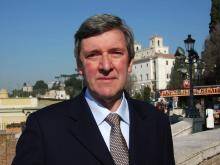Since his election as bishop of Rome, Pope Francis has sought to engage in acts of ecumenism rather than in interminable discussions about ecumenical questions. His decision to go to Lund, Sweden, on Oct. 31, to commemorate the 500th anniversary of the Protestant Reformation is but the most recent example.
He believes in taking action in the ecumenical field wherever that is possible rather than waiting to reach theological agreement, which could take eons. He made this clear on the flight from Istanbul to Rome on Nov. 30, 2014, in his response to Alexey Bukalov, the TASS correspondent, who asked about the outlook for relations with the Patriarchate of Moscow.
He began by saying: “I believe we are moving forward in our relations with the Orthodox; they have the sacraments and apostolic succession.... What are we waiting for? For theologians to reach an agreement? That day will never come, I assure you. I am skeptical. Theologians work well but remember what Athenagoras said to Paul VI: ‘Let’s put the theologians on an island to discuss among themselves, and we’ll just get on with things!’ I thought that this might not have been true, but Bartholomew told me: ‘No, it’s true, he said that’.”
Pope Francis added: “We mustn’t wait. Unity is a journey we have to take, but we need to do it together.” This journey involves “spiritual ecumenism”—that is, praying together, working together, doing works of charity together, teaching together, “moving forward together.” Then there is the “ecumenism of blood.” when they kill Christians irrespective of denomination; and these martyrs “are crying out: ‘We are one! We already have unity, in spirit and in blood.’” This latter ecumenism “helps us so much,” “tells us so much,” and so “we have to take this journey courageously....”
Then, turning to Moscow, Francis revealed: “I told Patriarch Kirill...I’ll go wherever you want, you call me and I’ll come. He too wants this. Both of us want to meet and move forward.” This long-awaited encounter will take place in Cuba on Feb 12.
Besides the Orthodox, Francis has made significant ecumenical gestures to other Christian churches and communities: to the Anglicans by inviting the archbishop of Canterbury, Justin Welby, to lunch; the Pentecostals by visiting their community near Naples; and the Waldensians by doing what no pope had ever done in their 800 years’ existence. He visited them in Turin and asked forgiveness for their mistreatment by the Catholic Church.
Then on Jan. 25, at an ecumenical service at St. Paul’s Outside the Walls in Rome, Francis told representatives of the other Christian churches and communities that “there cannot be an authentic search for Christian unity without trusting fully in the Father’s mercy”; and after encouraging everyone to “ask for forgiveness for the sin of our divisions,” he said:
As the Bishop of Rome and the Shepherd of the Catholic Church, I want to ask forgiveness and mercy for any behavior on the part of Catholics toward Christians of other churches that did not reflect the values of the Gospel. At the same time, I invite all Catholic brothers and sisters to forgive if, today or in the past, they have suffered offenses from other Christians. We cannot erase what is past, nor do we wish to allow the weight of past transgressions to continue to pollute our relationships. The mercy of God will renew our relationships.
That same day the Vatican made the surprise announcement that Francis will travel to Lund, Sweden, to participate in a joint Roman Catholic and World Lutheran Federation commemoration of the 500th anniversary of the Protestant Reformation. The W.L.F. was founded in Lund in 1947. His presence at this historic commemoration has a deep ecumenical significance that can be properly understood only in light of the document “From Conflict to Communion,” issued on June 17, 2013, by the Lutheran-Roman Catholic Commission on Unity.
His participation in this historic commemoration “is very important and marks a point of arrival on the journey to unity,” Bishop Brian Farrell, secretary of the Pontifical Council for the Promotion of Christian Unity, told me. It is the latest example of Pope Francis building ecumenical bridges, rather than talking about doing so.








